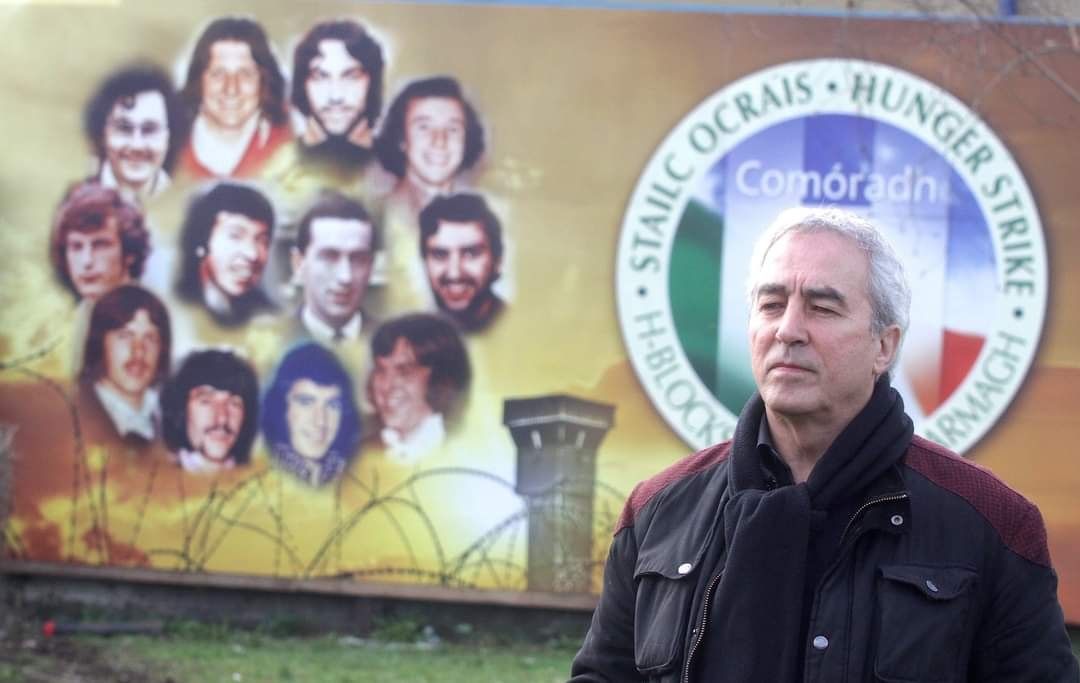Republicans across Belfast and beyond marked the 40th anniversary of the end of the 1981 hunger strike on Sunday.
On 3 October 1981, the protesting prisoners in the H-Blocks of Long Kesh announced the end of the 217-day hunger strike, which claimed the lives of 10 men: Bobby Sands, Francis Hughes, Raymond McCreesh, Patsy O'Hara, Joe McDonnell, Martin Hurson, Kevin Lynch, Kieran Doherty, Thomas McElwee and Michael Devine.
In a statement, the republican prisoners said they had been "forced" to end the hunger strike due to "the reality of sustained family intervention".
Six men remained on the hunger strike until it was called to halt, including the now Sinn Féin MLA Pat Sheehan.
On Sunday, Mr Sheehan reflected on his 55-day hunger strike and on the sacrifices of those who died during the protest.
"On that Saturday afternoon, I was lying on my prison bed in the H-Block hospital having entered my 55th day on hunger strike after replacing my comrade, Kieran Doherty TD," said Mr Sheehan.
"By this stage I was almost totally blind, weighing but seven-and-a-half-stone and constantly vomiting green bile.
"Four days prior to the end of the hunger strike, I was examined by an external doctor,"he recalled. "He asked me to lay back flat on the bed, before pressing his fingers gently under my ribcage on the right hand side. I almost leapt out of the bed in agony as the pain radiated throughout my entire body.
"My condition was severe and life threatening. My liver had become enlarged and began to shut down. The doctor told me that even if I ended my hunger strike there and then he couldn't guarantee my survival.
"As blunt as this news was I didn't let it cloud my vision or commitment in seeing the hunger strike through to the end. I had created a psychological and emotional shield around myself – it didn't matter if I got good news or bad news. It didn't matter what rumours were circulating about a resolution being found to the hunger strike.
"Myself and the other hunger strikers were under no illusion of what it meant to volunteer for the hunger strike. We were told quite clearly that when commencing the hunger strike, you would be dead in two months. the reality was really that stark, there was no dressing it up – not you might be dead or you could be dead, but that you will be dead."
Mr Sheehan told how he was advised of the republican leadership's intention to end the hunger strike, and was advised that halting his fast would increase his "chances of survival". However, he would see out the hunger strike until it was officially ended.
"At 3pm on the 3rd of October, all those who were left on the hunger strike gathered in my cell in the prison hospital," he recalled.
"I called in the Chief Medical Officer and told him that we were terminating the hunger strike. We were gathered in my cell, defiant, unbowed and unbroken. Thatcher tried to label our struggle for national liberation as criminal. The screws tried to break us with beatings, strip searches and torture tactics, but what they failed to grasp or understand, is that there is nothing in their whole imperial arsenal that can break the spirit of one Irishman who doesn't want to be broken.
"The aim of criminalisation was to isolate, marginalise and ultimately defeat our struggle. The sacrifice of our comrades ensured that the outcome was actually the opposite of what the British intended. Our struggle has gone from strength to strength, and we are now within touching distance of a united Ireland, the objective for which our ten comrades sacrificed their lives.
"The sacrifices of Bobby and Frank, Raymond and Patsy, Joe and Martin, Kevin and Kieran, Thomas and Micky, will continue to inspire us as we build a new republic."





